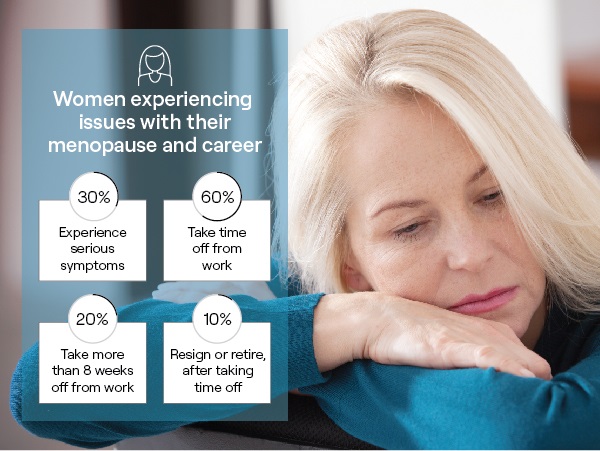Today is International Women’s Day. It’s an annual invitation to reflect on the role that women play in our lives, work, and planet. By 2025 more than 1 billion women in the world will be experiencing menopause. In Canada, the number will be more than 5 million. I want to bring some insights into the impact of menopause on our lives, women, and careers.
If you assume that the average woman will likely live until 90-100 years old, that means most women will spend up to half of their life in a menopausal state because menopause begins between the age of 45-55.
Perimenopause is a term used to describe when a woman’s period becomes irregular both in terms of frequency and flow.
Menopause marks the end of a woman’s menstrual cycle and fertility.
Post-Menopause is a term most people use to describe when a woman has not had a period for 1 year and medically her Follicle Stimulating Hormone (FSH) is over 35 IU/L.
According to the Society for Endocrinology, 1 in 4 women will experience serious menopause symptoms.
There are both physical and emotional symptoms:
- Heavy periods and cramping –lead to anemia and fatigue
- Hot flashes and sweats
- Impaired sleep
- Mood swings and irritability
Once menopause becomes more entrenched:
- Weight gain – about 15% – increasing the risk of diabetes
- Bone loss leading to osteoporosis
- Increase in cardiovascular disease and stroke
This impacts a women’s quality of life at home and at work.
I believe that menopause is yet another cause for the glass ceiling effect – which is a term for women being unable to reach the higher levels of an organization. The average age for menopause is 51, just at the peak of most women’s careers.
Since menopause generally lasts between seven and 14 years, millions of postmenopausal women are coming into management and top leadership roles at age 54, while experiencing mild to severe symptoms such as depression, anxiety, sleep deprivation, and cognitive impairment, to name a few.
Here’s what women said about the impact of their menopause:

If you are menopausal – do not suffer in silence. You get no medals for it.
There are effective ways to guide you through this very natural phase of your life. You will also want to manage post-menopausal health risks moving forward. Find a healthcare professional who knows how to manage menopause. That includes:
- Diet management – cutting out the sugars, caffeine, and alcohol
- Exercise regularly, cardio and weights
- Meditate
- Consider effective doses of supplements (red clover, wild yam)
- Hormone Replacement Therapy
Unfortunately, only 1 in 4 women have discussed their hormonal changes with their doctor.
Ladies, we need to change the narrative by proactively managing our menopause and in turn, taking better control of our career destiny.
Check out my WELLNESS WEDNESDAYS segment on this menopause topic on CP24 Breakfast this week.



